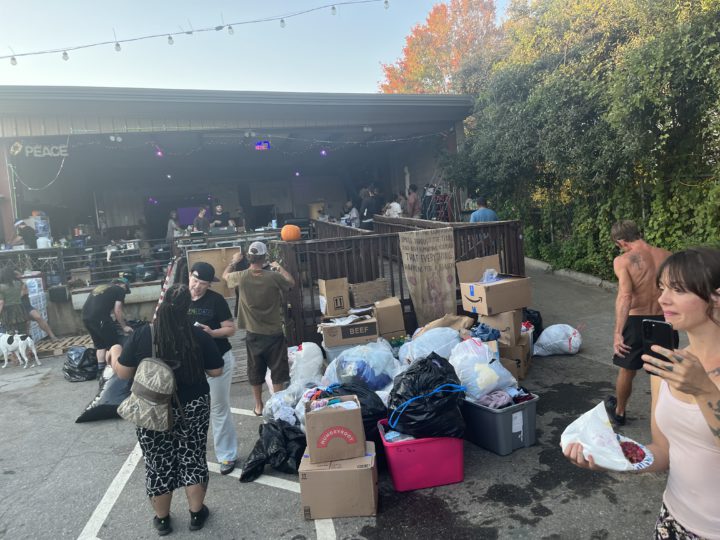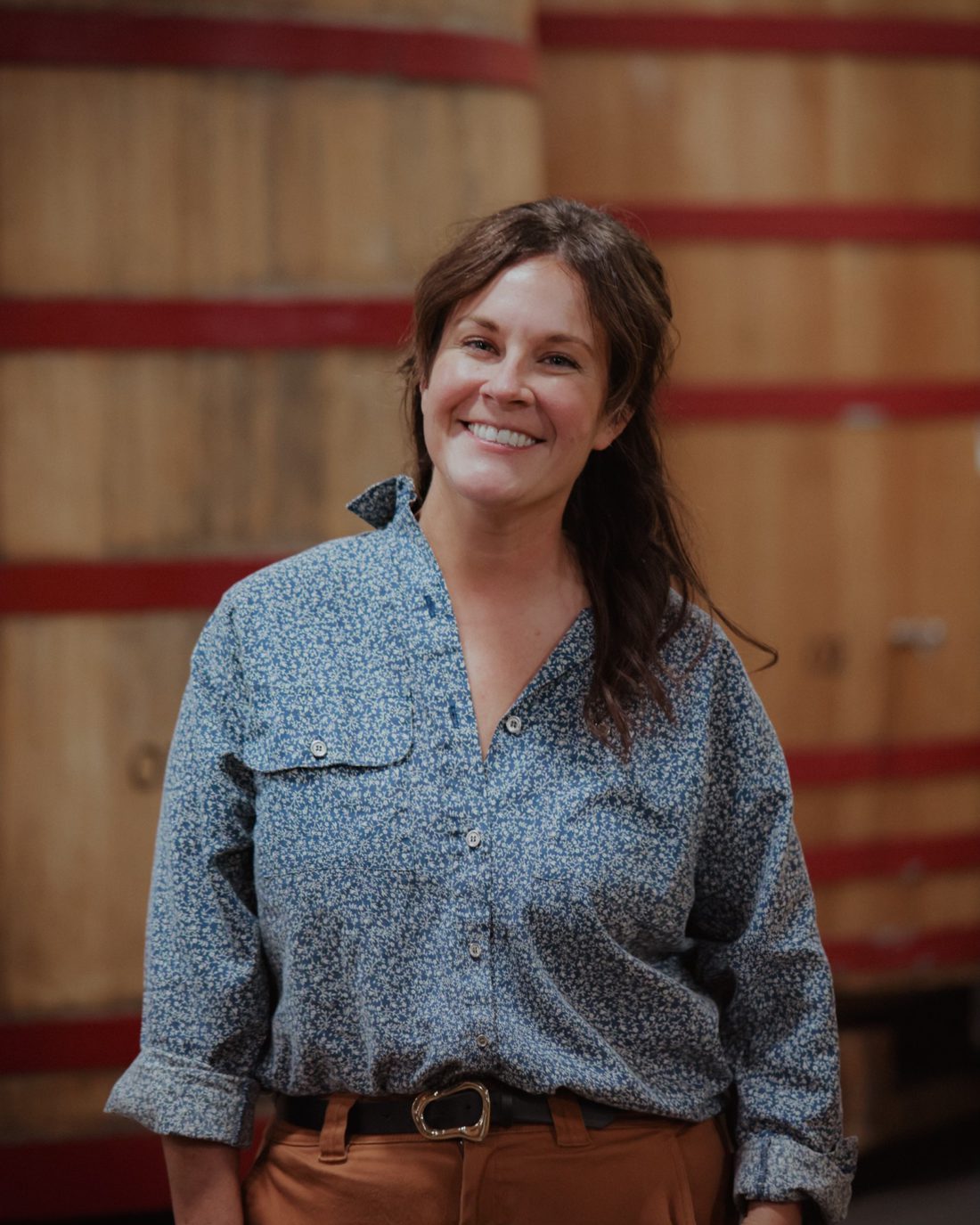Just after Tropical Storm Helene hit Western North Carolina, Eric Robinson and Matt McSwain, business partners at Acme Aero in Maiden, got a call from their friend Doug Jackson of Operation Airdrop. Jackson, whose Texas-based volunteer-run organization deploys airplanes to natural disaster zones, wanted to help those impacted by the storm. Familiar with the area, Robinson and McSwain knew that airplanes would struggle to navigate WNC’s unique mountain topography. If they wanted to run rescue missions, what they needed was helicopters.
Robinson and McSwain sent out a call to their friends, asking volunteers with privately owned helicopters to fly in and help. By the Sunday after the storm, they’d set up a base at Hickory Regional Airport and expected about 15 pilots to show up, says Robinson. Instead, more than 100 choppers arrived from all over the country.
The support was overwhelming, but fortunately for local residents, the outpouring has not been unique to Robinson and McSwain’s experience.
Xpress recently caught up with several individuals who mobilized into action immediately after the storm, leading search-and-rescue missions, distributing supplies and gathering funds for long-term support. All say they plan to stick around to help for as long as it takes the region to recover. And they stress that recovery will come in phases, requiring them to adapt their missions in order to support the community’s evolving needs.
Flying missions all over WNC and witnessing the devastation firsthand, Robinson says, “To say it’s apocalyptic is not an exaggeration. … The sheer magnitude of the water and the mud that went through there, it’s hard to explain to anybody that hasn’t seen it.”
Project Camelot
Like so many people in WNC, Autumn Mullins spent the first few days after the storm without cell coverage or internet service and no way of knowing about the widespread damage that Robinson and his crew were witnessing. But there were clues in her Hendersonville neighborhood — old-growth trees had come down, and power lines had snapped in half.
When her cell coverage returned on Sunday, Mullins began scrolling through groups on social media and seeing the many calls for help. One comment on a post stood out to her: A man said he and others in his mobile home park were trapped on a mountainside without food, water, gas or a way to get out. Mullins immediately messaged the man.
Since reception was still spotty, it took four hours before Mullins could get the man’s location. Soon after, she loaded her car with water and drove out to the 55-unit Camelot Senior Mobile Home Park and began knocking on doors and talking to residents to find out what they needed. She compiled a list — items such as water, nonperishable food, candy for diabetics, incontinence products, denture cream, propane, cat litter, toilet paper and wet wipes — and sent out a call on Facebook for donations.
After her post, Mullins says, “The community came together immediately.”
Within days, Mullins raised nearly $800. Kasey Jackson, founder of the lotion candle company Element Tree Essentials, donated $3,000 worth of supplies, according to Mullins. A man from South Carolina sent in 40 cases of water. Mullins pulled together a team of 15 volunteers to assemble care packages that they personally delivered to the 75 and older residents of Camelot.
Mullins, who previously worked as an event manager and community coordinator, had no prior experience with disaster relief. After the success of Project Camelot, things “kind of snowballed,” she says.
Among those who reached out to Mullins was Tracy Roberts of the Greenville, S.C.-based Runway Relief Project — now called Carolinas Relief Project — which provided a fleet of helicopters and private planes that brought aid to WNC in the immediate aftermath of Helene. Roberts offered Mullins supplies. Mullins, expecting a pickup truck of goods, was shocked when a 32-foot box truck arrived. She quickly secured temporary warehouse space to store the donations and began connecting with local groups to find out who was most in need.
Mullins, who grew up in WNC, has been bolstered by how quickly the community rallied around each other. “Appalachian families lean on each other,” she says. “The people from the hollers and the hills, they’ve been through some traumatic times in history and they really know how to pull themselves up by their bootstraps. … But mountain people, they got some strong boots. … Witnessing it changed my life. I’m a whole different person.”
Mullins has since decided that she wants to be a part of the recovery efforts for the long haul. She formally incorporated United Appalachia — a mutual aid organization fostering community through direct action.
Mullins is currently searching for a permanent warehouse and plans to continue collecting and distributing supplies, but, she says, that’s not the organization’s primary mission. “My goal is to unite Appalachia. … I really want to help these people be stronger.”
Over the long haul
Like Mullins, Marshall native Rachel Dudasik has been struck by the strength of her community, and she is committed to helping the region return to the vibrant, artistic place it was before the storm. Dudasik is hopeful that recovery is possible because she’s seen it happen before.
In 2004, Dudasik witnessed the flooding in Asheville due to Hurricane Frances. She recalls how the Lowe’s parking lot on Tunnel Road “looked like the things you see on TV from disaster zones.” And she remembers that it took some time for places such as Biltmore Village to fully recover.
After Helene, Dudasik evacuated to Charlotte with her father, who was in need of medical care. From there, she saw early on the impacts of the storm through news reports and social media. She knew immediately that WNC would be facing a yearslong recovery.
Dudasik, who has a background in nonprofit management and currently serves as the community engagement and communications manager at Wicked Weed Brewing, wanted to make sure individuals, nonprofits and businesses would have the funds to rebuild — not just in the immediate aftermath of the storm, but in the months and years to follow. She partnered with the Community Foundation of Western North Carolina to create the WNC Long Haul Recovery and Resilience Fund, a donor-advised fund for disaster relief. To date, the initiative has raised over $500,000. Dudasik says she is distributing grant money at three-month, six-month, one-year and three-year marks, ensuring the community has ongoing support.

Unlike other grant programs that involve lengthy paperwork, the WNC Long Haul fund doesn’t require an application process. Instead, Dudasik, the Community Foundation’s advisory board and local stakeholders determine where the funds should go. As the money is released, Dudasik says she will make the information public.
She says she hopes to focus on organizations that “aren’t getting as many funds or aren’t getting as much spotlight.”
The fund is designed to target three areas of need: culture and arts, local businesses and long-term individual support. Dudasik explains the categories are intentionally broad so she can send the money to where it’s most essential at each benchmark. She also believes WNC’s artists and local businesses are what make the community special and she doesn’t want to see those disappear.
“Asheville is known for its heart,” Dudasik says. “We’re known for creativity and artists and music and resiliency, and that’s what I want to see come back.”
Shifting gears
Back at the airbase, Robinson says he understands the importance of long-term support in WNC.
“We received so much support in the way of financial donations, physical donations, people donating their time,” Robinson tells Xpress. “We learned that, especially in the aviation community, people really want to help; but a lot of times, they just don’t know how. More than anything, we gave them a conduit and a way to plug in and help in real time.”
As of Nov. 7, Robinson says the group, now formally launched as Operation Helo, has run over 2,000 missions, delivered more than 2 million pounds of supplies and extracted 439 people. Six weeks after the storm, they are still performing search and rescue missions. As Robinson spoke to Xpress, two of his helicopters were headed to Yancey County to reach a pocket of people who had been stranded since the storm.
More recently, Operation Helo has shifted its focus to a long-term but urgent need — housing.
“This is a once in a thousand-year storm,” Robinson explains. “No one evacuated. There were so many people caught off guard. So many people have lost everything, including family members.”
Now, with the help of private donations, Operation Helo is working to bring campers to families that have lost everything. The organization has received over 250 requests and has already delivered 100 units. For this latest project, the group is working in coordination with local fire departments to ensure campers get to people truly in need.
Permanent housing solutions, says Robinson, is next on the list, as Operation Helo hunkers down for the region’s slow recovery. “This is our backyard. These are our neighbors. So we are going to continue to help as long as we can possibly help,” he says.
Rebuilding together
Mullins of United Appalachia is also committed to sticking around.
She’s currently preparing for winter — collecting heaters and generators to distribute — and hoping to meet more long-term needs like collecting materials for rebuilding homes, finding jobs for people who are unemployed and establishing contacts with government organizations designed to offer aid.
Mullins encourages others to volunteer, adding that you don’t have to be a first responder to have a real impact.
“Go up to a distribution hub and just start volunteering,” Mullins urges. “Because folding the clothes and sorting the food is just as important as the teams that are doing the search and rescue. Because folding the clothes and sorting the food is going to get into the hands of people who need it.”
Despite the task ahead, Mullins remains optimistic.
“I really hold a lot of hope for the future,” she says. “I think Asheville is going to be better for it because I think a lot of people are waking up to how much you can do if you’re doing everything together.”






Restores my faith in humanity. Heartfelt gratitude to all who volunteer and continue to work so hard